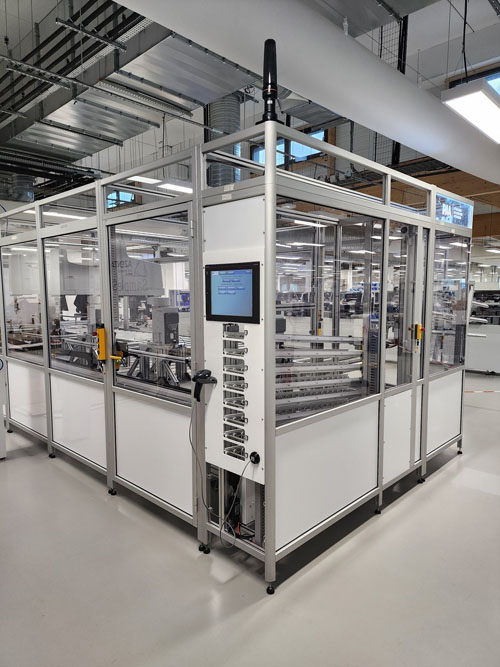However, the mass implementation of new blood test types remains a major challenge for the pathology automation industry.
One company rising to this challenge is Hampshire-based PAA (Peak Analysis and Automation Ltd), a leading provider of automation technology to research institutions and major pharmaceutical, biotechnology and laboratory automation companies.
Having supplied systems to the likes of Moderna, BioNTech and Janssen Pharmaceuticals, PAA is now helping to develop an automated cold storage interface for one of Europe’s largest private pathology providers: Laboratoire CERBA (Lab CERBA).
The problem
There is a growing need for pathology providers to adapt to the emergence of new blood-testing technology and blood biomarker research. However, there is currently no approach to connect the research and pathology production platforms.
“A key requirement for Lab CERBA to meet the growing number of blood testing possibilities is the ability to quickly sort and store the samples at different temperatures,” says Jon Newman-Smith, Research and Development Director at PAA.
“For example, if you’ve had a blood test and you’re waiting for the results, the sample will need to be sent to cold storage, which operates at 4 °C, to preserve it in case any further analysis or an additional test is needed. Other samples need to be kept for longer with storage at –20 °C.”

One of the biggest barriers Lab CERBA has faced in terms of meeting future demand is a lack of cold storage capacity in existing solutions of Total Laboratory Automation (TLA) systems. Instead, it had previously opted for an alternative solution from a different area of life science.
This solution provided a tailored cold storage facility that could significantly increase capacity if it could be integrated into the existing TLA system.
Without an integrated solution all the samples being processed by the TLA — in the region of 2000 per hour — would have to be sorted by hand. The Lab CERBA team soon realised that manually processing individual tubes would inhibit the potential benefits of a fully automated pathology lab.
After learning of the success of a previous project for another part of the CERBA group, the team approached Jon and his colleagues at PAA to help resolve the problem and explore the pathway to enable faster sample retrieval allowing rapid Turn-Around-Times (TAT).
The central challenge was to create a workcell in which the sample tubes could be taken from the TLA system and then sorted into a format accepted by the storage unit — all while optimising both the capacity and throughput of the storage platform.
This approach presented the challenges of different tube sizes, a lack of sample tracking data and varying throughput demands throughout the day. However, PAA remained committed to finding an effective solution.
The solution: automate to innovate!
This was not the first large-scale sample-processing system that the PAA team were asked to deliver, having recently designed and built workcells for COVID-19 testing during the height of the pandemic.
One of the key learnings from this project was the need to take inspiration from other more established automation methods that deliver the requisite speed, robustness and repeatability. To achieve this, PAA once again turned to long-term automation partner, Mitsubishi Electric.
“We had used Mitsubishi Electric SCARA robots in our COVID-19 testing workcells for UKHSA. That was the first time we had three robots in very close proximity running at full speed, so we knew they could operate in a narrow working envelope with reliable collision avoidance,” Jon continues.
“While working to an ambitious target takt time, given its pedigree in manufacturing pick-and-place applications, we were confident that the SCARA robot was the right choice.”
The PAA workcell developed for Lab CERBA comprises four Mitsubishi Electric FR-Series SCARA robots with a 20 kg payload and a maximum reach of 1000 mm.
The robots benefit from high-rigidity arms and cutting-edge servo controls to reach speeds of 13,283 mm/s and are powered by Mitsubishi Electric’s MELSEC iQ-R controller.
This not only controls the robots but also the rest of the handling system, which is automated with MR-J4 Series servos and E800 variable speed drives.
The future
The workcell is currently going through the final commissioning process at Lab CERBA’s purpose-built facility in Paris.
Currently, although there will be no direct integration between the TLA and the PAA workcell, Lab CERBA technicians will now only be required to load the workcell with racks of samples, instead of manually processing each sample in and out of the cold storage system.
This will significantly increase the overall productivity of the Lab CERBA processing capability. PAA is collaborating with TLA partners to create a seamless physical and data bidirectional connection to TLA systems.
Using PAA’s integration software this connection provides the bridge between research and diagnostics, enabling faster scientific breakthroughs in novel blood biomarker screening. The ability to conduct novel screening assays at scale will further accelerate pathology automation in Europe.
“We’ve effectively taken industrial automation methodologies and approaches in technology and applied them to this industry,” Jon concludes.
The use of laboratory automation and robotics has become widespread in clinical laboratories around the world. Laboratories are confronted with unrelenting pressure to produce faster turnaround times and reduce errors to improve patient care.
Since the development of PAA’s automated cold storage interface system at Lab CERBA, other customers have identified that several hospitals and pathology groups throughout Europe that could benefit from this type of platform.

